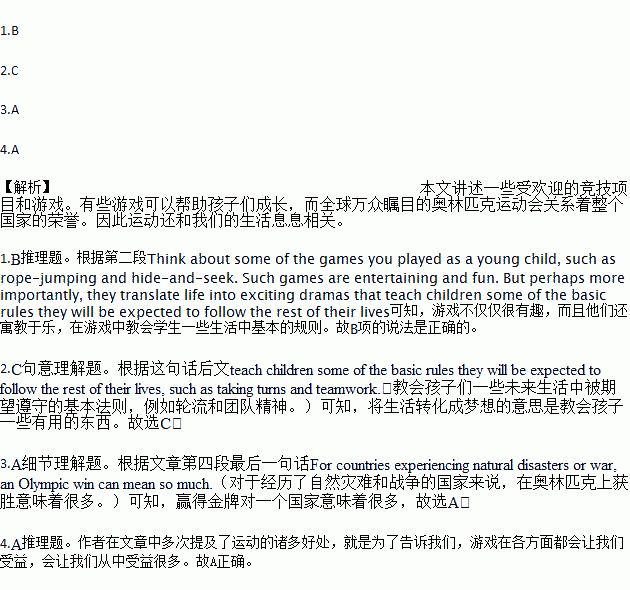题目内容
Why play games? Because they are fun, and a lot more besides. Following the rules… planning your next move…acting as a team member…These are all “game” ideas that you will come across throughout your life.
Think about some of the games you played as a young child, such as rope-jumping and hide-and-seek. Such games are entertaining and fun. But perhaps more importantly, they translate life into exciting dramas that teach children some of the basic rules they will be expected to follow the rest of their lives, such an taking turns and cooperating(合作).
Many children’s games have a practical side. Children around the world play games that prepare them for work they will do as grown-ups. For instance, some Saudi Arabian children play a game called bones,which sharpens the hand-eye coordination(协调)needed in hunting.
Many sports encourage national or local pride. The most famous games of all, the Olympic Games, bring athletes from around the world together to take part in friendly competition. People who watch the event wave flags, knowing that a gold medal is a win for an entire country, not just the athlete who earned it. For countries experiencing natural disasters or war, an Olympic win can mean so much.
Sports are also an event that unites people. Soccer is the most popular sport in the world. People on all continents play it—some for fun and some for a living. Nicolette Iribarne, a Californian soccer player, has discovered a way to spread hope through soccer. He created a foundation to provide poor children with not only soccer balls but also a promising future.
Next time you play your favorite game or sport, think about why you enjoy it, what skills are needed, and whether these skills will help you in other aspects of your life.
1.Through playing hide-and-seek, children are expected to learn to _____.
A. be a team leader B. obey the basic rules act
C. as a grown-up D. predict possible danger
2.The underlined part in Paragraph 2 most probably means that games can_____.
A. describe life in an exciting way
B. turn real-life experiences into a play
C. make learning life skills more interesting
D. change people’s views of sporting events
3.According to the passage, why is winning Olympic medals so encouraging?
A. It inspires people’s deep love for the country.
B. It proves the exceptional skills of the winners.
C. It helps the country out of natural disasters.
D. It earns the winners fame and fortune.
4.What can be inferred from the passage?
A. Games benefit people all their lives.
B. Sports can get all athletes together.
C. People are advised to play games for fun.
D. Sports increase a country's competitiveness.
 名校课堂系列答案
名校课堂系列答案
